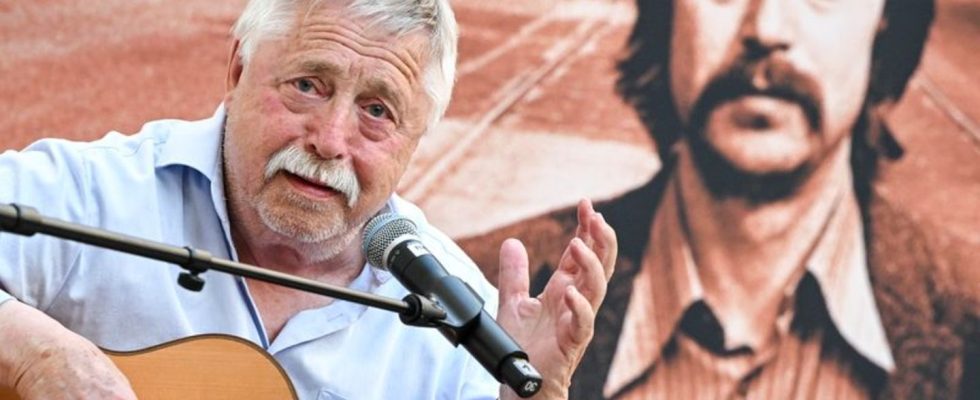Berlin
Cloudy springs, strong songs – exhibition on Wolf Biermann
The lyricist and songwriter Wolf Biermann sings at the opening of the exhibition “Wolf Biermann. A lyricist and songwriter in Germany” in the German Historical Museum. photo
© Jens Kalaene/dpa
Wolf Biermann is also a German-German artist like no other. The singer-songwriter stands for the worlds in East and West. A historical exhibition illuminates the dazzling figure.
Eckerman? hangman! The Stasi spy probably didn’t understand something correctly – or wanted to misunderstand something. The protocol of the GDR state security deviates from the text at a crucial point Wolf Biermanns. “The Stasi is my Eckermann,” sings the famous singer-songwriter, alluding to Goethe’s secretary, who noted everything. Biermann’s Stasi monitor made it “The Stasi is my hangman”.
“Secret service files are murky sources,” says Raphael Gross. The President of the German Historical Museum in Berlin and his team took a close look at Biermann. With the exhibition “Wolf Biermann. A lyricist and songwriter in Germany” from Friday to January 14, they tell a large piece of German-German history based on the biography of the 86-year-old.
According to information from Wednesday, the museum was not only able to draw on its own extensive holdings. A large part of the 281 objects comes from the huge inheritance that Biermann left to the Berlin State Library two years ago. There are also objects from the private collections of Wolf and Pamela Biermann.
Angela Merkel is also among the guests
At the opening in the evening, Biermann insists on a small appearance. “You have to ask me not to sing,” he says. Biermann sings his songs in the packed foyer of the museum, and among the enthusiastic listeners are ex-Chancellor Angela Merkel, Minister of State for Culture Claudia Roth and many people who somehow crossed one of Biermann’s many paths.
“If you hear the song, you don’t need to see the exhibition,” announces the singer. “Only those who change remain true to themselves”. And immediately improves himself: “No, it complements wonderfully”. He also sees a cross-connection in “Ermotivung”, also one of his most famous songs: “They found something here that I don’t have.” He means a church book with the Swedish version of the song against bitterness even in hard times.
The exhibition revolves around the life and work of the poet and songwriter and the connections to German-German events. Born in Hamburg, Biermann moved to the GDR in 1953 and was expatriated by the GDR in 1976 after a concert in Cologne. The expulsion and the subsequent protests in the GDR are considered a political turning point in German-German post-war history.
Biermann’s life and work has already been honored with exhibitions in Bonn and Leipzig. In Berlin, the piece of contemporary history is told in eight themed rooms. A separate area deals with numerous examples of how art criticism perceived Biermann’s poetry and songs.
“As soon as he appears, there will be trouble”
Curator Monika Boll and project manager Dorlis Blume repeatedly use striking objects as visual hooks in the exhibition – for example the harmonium from the Cologne concert in 1976 or the massive “Type KG II” file cabinet used by the Stasi, in front of which there is a folder with copies from Biermann’s Stasi file. The controversy over the Stasi legacies – Biermann was one of the first to advocate for the preservation of the files – is made clear by one lumpy thing: Kollermasse. The water-mixed snippets of the shredded files have solidified into a shapeless lump.
The appropriate songs by the singer such as “Don’t wait for better times” or the “Ballad of the Prussian Icarus” can be heard at the respective stations. The Cologne concert can be watched in its entirety.
A concert poster from 1963, with several stickers about postponements and cancellations, bears witness to the back and forth of the GDR authorities when dealing with the singer. Biermann actually fit in well with the GDR concept: a Marxist came to the East from the West, his father was a communist who was murdered by the Nazis.
But the man, celebrated as a political artist, would not let those responsible rest with his desire for freedom. This hardly changed after expatriation to the West. Curator Boll summarizes what can also be seen in the exhibition as follows: “As soon as he appears, there is trouble.”

